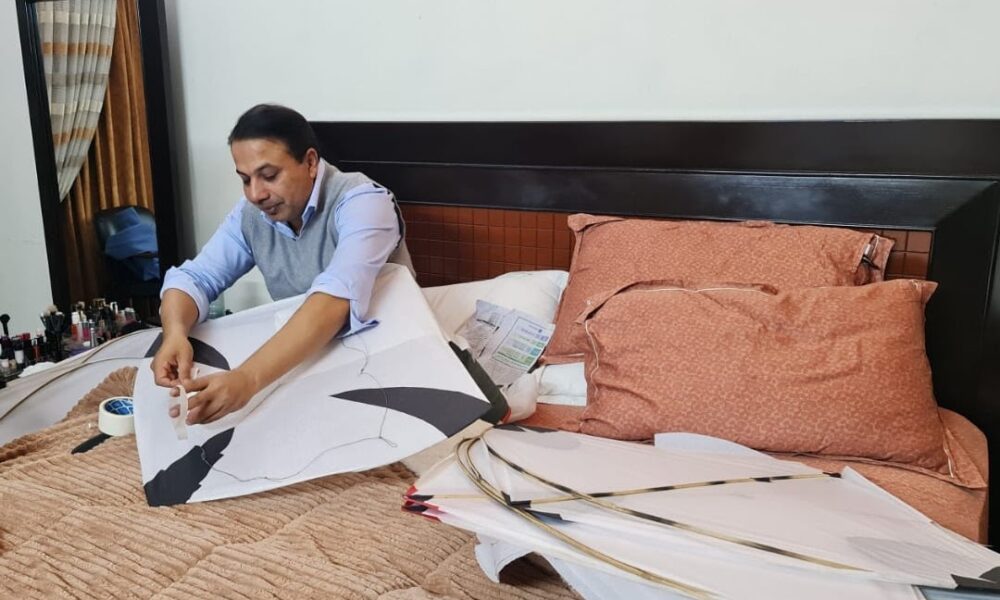The paper rustles in my hands, light on my fingers, delicate, flimsy, daring to tear apart if treated with the slightest harshness (much like me). I put the wire through the holes, stretch the paper out, and add a little tassel to the end, making the patang my own. My dad stands on the opposite end, guiding and guarding, because he knows if this kite, my beloved guddi, gets the slightest rip, my eyes will let loose the river Nile.
Slowly, gently, tenderly, we prepare the kite, making sure it’s armed and ready for its biggest fight. Tomorrow, it will be time to launch it into the sky, along with the many other kites on perhaps their first flight. Signalling the coming of spring, the patangs will speckle the horizon with splashes of yellow, red, blue, black, and white.
I wake up to the smell of jalebis and halwa wafting in from the kitchen, inviting us to adorn ourselves in pink, yellow, and orange for the much-anticipated festival of Basant. My siblings and I put on our sharpest kurtas and run up to the roof, where my father is setting up the kites and making light-hearted conversation with the neighbour, boasting about the strength of his string and already challenging him to a duel.
All around us, roofs and terraces fill up with families submerged in electrifying joy, as vendors hark from down below, inviting us to buy sweet and savoury delicacies and traditional artifacts. The sun begins to rise, kites take to the sky, and the beats of the dhol gain momentum.
It is the spring of 2007. My relatives and cousins have all arrived, and we carry my great uncle, Aachoo Mamoo, who is terminally ill, up to the roof, along with his bed, in order to fulfill his dying wish of “celebrating Basant one last time.” He lies on the charpai, a traditional, woven bed, as my dad and uncles take up their kites, arm them with the most powerful dori (the string used to fly the kites), and wrap their hands in cotton bandages––a necessary precaution to prevent the string from slicing your hands through––to prepare for the kite fights.
They put themselves in teams, my dad with his brother and my mom with hers, with one member holding the big, heavy roll of dori and the other flying the kite itself. To make us feel included, they ask us to run with their patang, from one end of the roof to the other, so the kite has enough wind and momentum to soar directly into the sky.
And then, chaos ensues. “Pecha lag gaya!” shouts Baba, announcing that his kite is caught in another and the first battle of the day has begun. Everyone halts, holding their breath and staring high up into the sky, squinting to watch the two kites battling it out. Masterfully, Baba begins pulling on the string and letting it go, as his brother supports him by skillfully rolling and unrolling the string, artfully displaying the last 28 years of kite-flying teamwork.
Aachoo Mamoo props up on the charpai in excitement and, using all his strength, begins to guide my father and uncle, with his 50 or more years of experience in the art. Shortly, we see the other kite start to dwindle, and as it falls from the sky, our entire family bubbles with cheer and excitement, commending Baba on his skill and celebrating the win. And so, the evening passes. The battles continue, the kites soar high and fall low, and by evening, we’ve all had a hearty share of celebration and are already anticipating next year’s festivities.
However, next year never came. Not only for Aachoo Mamoo but for the rest of us as well. With the increasing production and use of unsafe doris, coated with glass and metal fillings that proved fatal for many, the government banned the festival altogether. So, if tomorrow I was granted one wish, I would channel Aachoo Mamoo and ask to relive the spring of 2007, to celebrate Basant once again.








